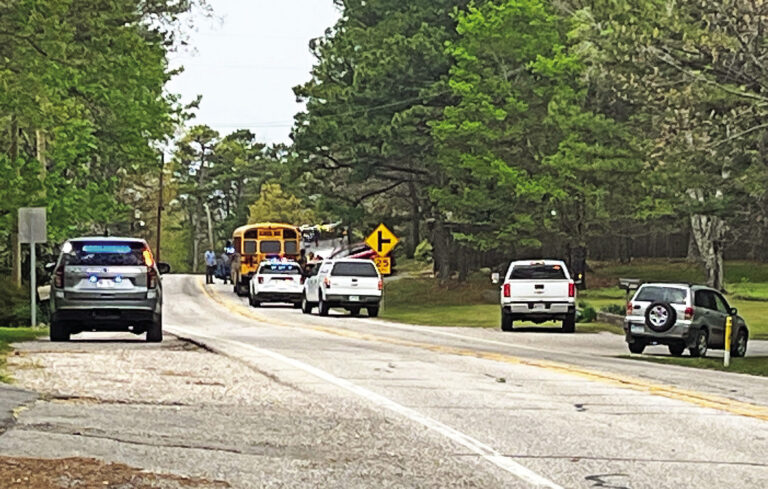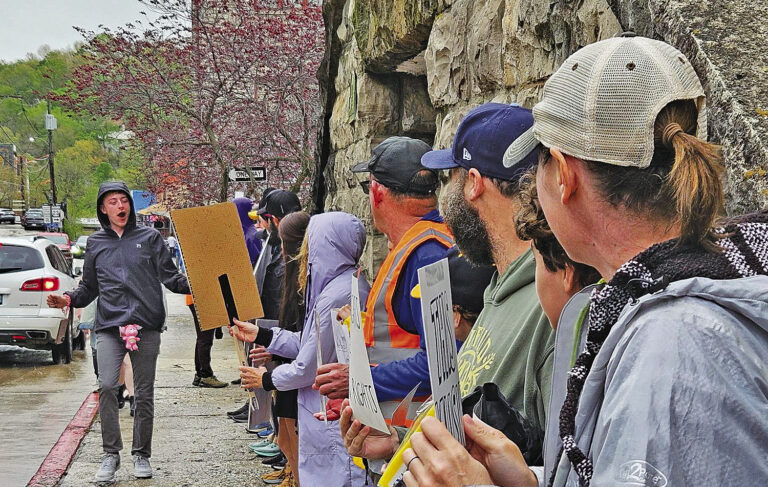The Eureka Springs Cemetery Commission apparently didn’t follow Arkansas law when it went into executive session twice over a two-day period, terminating one employee and — according to documents — promoting another.
The commission conducted four special meetings May 17-18 in the lobby of The Auditorium, the main topics being the roles of sexton and groundskeeper at the cemetery.
In the end, and with no public explanation, cemetery sexton and head groundskeeper David Helms was terminated and part-time groundskeeper Ozzy Duarte received a promotion to a full-time role.
Recordings of the meetings, which are audio-only, do not include a commission vote on any action regarding Duarte in open forum, but personnel file records obtained by the Lovely County Citizen through the Freedom of Information Act, show he was promoted on May 18, the same day a special meeting to discuss the newly vacant groundskeeper role took place.
The lead groundskeeper role became vacant a day earlier when the commission held a special meeting to discuss “cemetery personnel.”
Commission chair L.B. Wilson opened the May 17 meeting by saying commissioners were there for a “special commission meeting for a personnel issue.” After roll call, Wilson asked for a motion to go into executive session.
Commissioner Judy Holden made a motion “that we move into executive session,” but gave no specific reason why, as state law requires. After a second and a vote, Holden can be heard on the recording saying, “I am turning off the recording devices.”
The Arkansas Freedom of Information Act outlines specific guidelines for public bodies meeting in executive session.
“(E)xecutive sessions will be permitted only for the purpose of considering employment, appointment, promotion, demotion, disciplining, or resignation of any public officer or employee,” the act says, with the only exception being for matters related to the security of a public water system or utility system. “The specific purpose of the executive session shall be announced in public before going into executive session.”
Decisions reached in executive session must be ratified by vote in public.
“No resolution, ordinance, rule, contract, regulation, or motion considered or arrived at in executive session will be legal unless, following the executive session, the public body reconvenes in public session and presents and votes on the resolution, ordinance, rule, contract, regulation, or motion,” the act says.
Little Rock attorney John Tull, who represents the Arkansas Press Association and is widely recognized as an expert on the FOIA, told the Citizen after a similar situation involving the Eureka Springs City Advertising and Promotion Commission in 2020 that simply declaring the purpose of an executive session is to discuss personnel issues does not satisfy the law’s requirements.
“When an entity goes into executive session, they must give a specific rather than a general reason,” Tull said then. “It can’t be just for personnel. It can be ‘we’re going for a personnel issue concerning hiring or firing somebody,’ or ‘we’re going for a personnel considerance regarding whether someone is going to be demoted.’ But it can’t be just a general personnel decision. … That’s clearly a violation.”
The next recording of the cemetery commission’s May 17 meeting picks up approximately an hour after the beginning of the executive session. In the second recording, the commission continues the open meeting and votes 5-0 to immediately terminate Helms, announcing that the role of cemetery sexton would be “taken over by the commission.”
No reasons were given for the termination, but documents obtained through the FOIA request from Helms’ personnel file indicate ongoing issues he had with cemetery superintendent and commissioner Bruce Wright.
Helms, who was hired Oct. 14, 2021, wrote a letter on March 14, 2022, addressed to Wright, describing the working environment as a “negative dynamic.” Helms requested that the letter be put in his personnel file.
“In my mind, in most instances, you relate to people in an affable and wise manner,” Helms writes to Wright in the letter. “You are often working alongside many others to do good things. You are a valuable resource for the care of our cemetery as well … I believe you do your best every day.
“But too often, from my perspective, you relate to me as an angry and distrustful opponent. If this oppositional dynamic occurred in our personal lives, the conflict would be easily resolved — I would present a momentary defense, as could you, and we would choose not to interact following the incident. This negativity is untenable while it relates to my employment.”
Helms writes in the letter that it is Wright’s opinion that “I do not get enough accomplished at the cemetery,” and that his honesty was questioned.
“I acknowledge that you may not always understand, in real time, why I am working offsite,” Helms writes. “Please remember that I have a work log and extensive Groundskeeper’s Reports, for your reference. I am also reachable by text and email.
“I do not accept that your complaints about my performance to the Assistant Groundskeeper, your verbal digs to me about my honesty while addressing cemetery concerns offsite, or your ridicule to my face about my qualifications; are acceptable in a workplace. Too often, when I explain my priorities for service hours, you angrily retort with mockery. If I mocked you in those instances, I would risk losing my job.”
Helms’ letter goes on to mention specific times during his employment when he felt disrespected by Wright, saying, “… my mouth is ‘tied’ as an employee, while your choices for acceptable words are much wider, as a supervisor.”
“I believe that you have enjoyed this hierarchy dynamic, whether purposefully or not, at the expense of my good workplace,” he wrote.
Helms closes the letter by writing that he will report to the commission any “additional incident of personal ridicule” from Wright.
“Likewise, I request that you bring any incidents of disrespect directed toward you from me to the Commission,” he writes. “I believe that outside perspectives may be our best remedy to stop this cycle of distrust and disrespect.”
In a three-and-a-half-page letter dated March 23, 2022, Eureka Springs human resources coordinator Jerry King writes to the cemetery commission outlining results of interviews he conducted with involved parties.
King’s letter says that that after receiving Helms’ letter nine days earlier, the commission “consulted the mayor’s office to ask if the H.R. Department would service as an impartial arbitrator to investigate and report to the commission.”
The main issue that resulted from the conversations, King writes, was with an “incomplete” job description that he reviewed with Wright.
“… I pointed out that this legal document was incomplete at best,” King wrote. “We also discussed the ‘intent of the document’ versus the ‘letter of the law’ of the document. I believe from our conversation; Mr. Wright understood the magnitude of challenges the document represents and subsequently he requested that I assist with a re-write.”
However, King writes, while he was willing to give input and direction, “…it is my understanding that the purpose of the Cemetery Commission is to create the objectives, language, goals, intent and direction of the Commission and its employees to serve the community.”
“The writing of the document should be a task of the Commissioners.”
Job descriptions of cemetery duties were included in Helms’ personnel file. According to the document, it was last amended Sept. 8, 2021.
King’s letter concludes by giving recommendations to Helms and the commission including tracking regular job priorities and asking Helms “to keep a log of what he does and when.”
Helms’ personnel file contains no other documents that reflect any job performance issue from the March 2022 letters until his “employee termination form” was submitted on May 17.
Helms signed the form, as did Wilson, the commission chair.
Included in the documents released by the city in response to the Citizen’s request for Helms’ personnel file was the employee termination form that lists his Social Security number. State law provides a specific exemption to the FOIA for personal information including Social Security numbers.
VOTE ON PROMOTION
A day after the commission voted to terminate Helms and divide the duties of the head groundskeeper and sexton positions into two roles, it promoted Duarte, Helms’ part-time assistant, into the full-time lead role.
While recordings of the May 18 special meeting called to discuss the groundskeeper position do not include any vote by the commission in open forum to promote Duarte, a “personnel action” form in his personnel file shows his status was changed from part-time to full-time on the same date. It was signed by Wright.
In the May 18 meeting, Wright said he met with Duarte earlier that morning to gauge his interest in possibly being promoted into the full-time role.
“I told him it would be a full-time thing and would be with benefits,” Wright told commissioners. “But I emphasized the importance of full time is commitment.”
Duarte was interested in the role, Wright said before reading a letter to commissioners from Duarte expressing his desire for the promotion.
Holden then inquired about Duarte’s time working at the cemetery. He was hired on Oct. 14, 2021.
“Bruce, may I ask you, how has he been since we’ve hired him,” Holden asked. “Your personal opinion?”
Wright started to answer before being cut off by Wilson. ??“That’s a personnel issue question,” Wilson said. “I don’t think that’s something we need to necessarily discuss at this time.”
Personnel issues need to be discussed in executive session, Wilson said.
“We can’t evaluate someone in open forum,” he said.
After discussing whether filling the role immediately was the best option, Wright told commissioners that Duarte was “ready to go” and “could start and stay on this thing.”
Wilson then said he thought “we need to go into executive session.”
Holden then said, “I move that we presently stop this meeting and go into an executive session.”
No specific reason for going into executive session — as required by law — was given and there was no recording available indicating that the meeting’s open forum ever resumed. That meant no recorded vote for any promotion, or for that matter, to adjourn the meeting.
Commission accepts bid for building at cemetery
The Eureka Springs Cemetery Commission has unanimously approved a contractor to build a new office building on cemetery grounds.
In a May 18 special meeting, the commission voted to accept a winning bid from Jeff Gay with Rockwood Construction of Eureka Springs as the contractor for the construction of the building.
Rockwood’s bid of $47,520 was selected over a bid of $52,421.99 from Dame Good Construction, LLC of Berryville.
Gay told the commission via conference call that he hoped to get work started on the new building in upcoming weeks.




